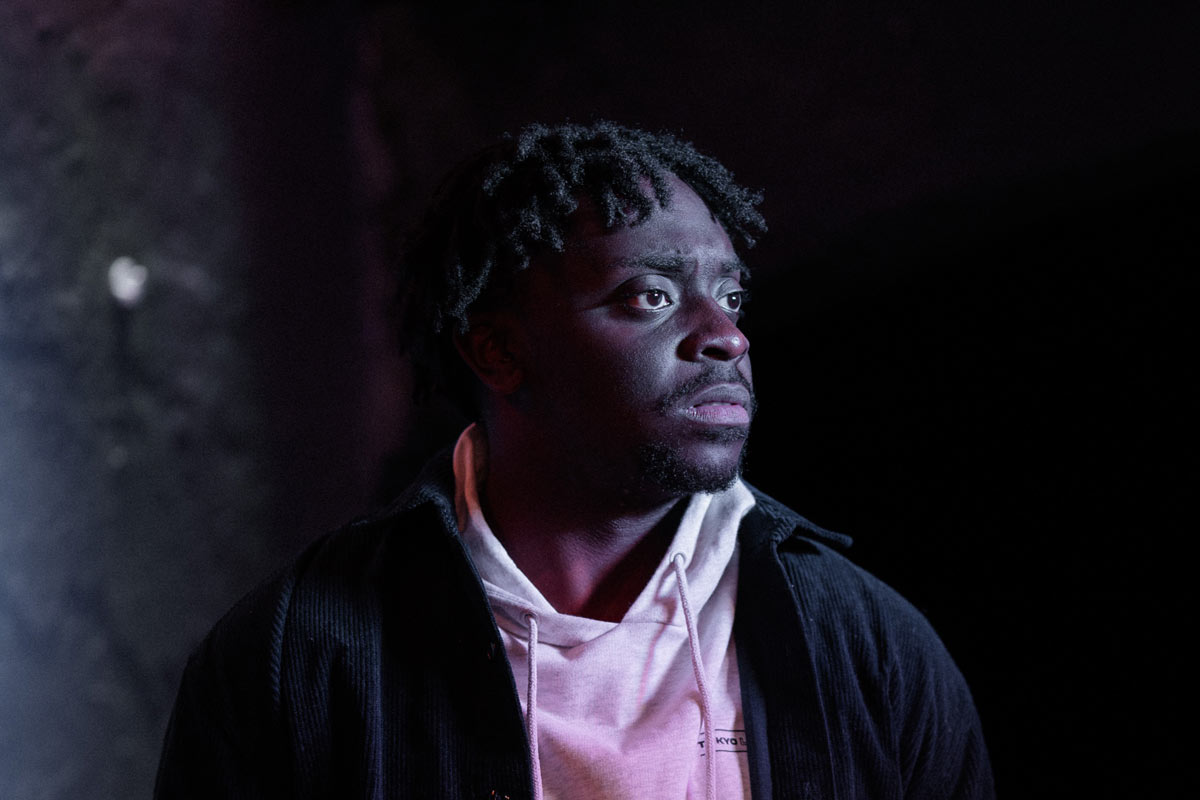Review: UNDER THE TABLE at Barons Court Theatre
Travelling from East to West London (and back again) on a cold, dark, winters evening, to view a small scale fringe production at an altogether unassuming little venue beneath a pub, is not exactly a labour of love, but it comes with the territory for a theatre reviewer. Tuesday was such an evening.
 Demi Iowu in Under the Table at Barons Court Theatre. Photography by Kinga Anna Dulka.
Demi Iowu in Under the Table at Barons Court Theatre. Photography by Kinga Anna Dulka.
So what to make of Aaron Thakar’s UNDER THE TABLE, a four-part amalgamation of sex, politics, money and religion? First off, the loosely connected vignettes feel like a student’s outpouring of semi-realised ideas which would enliven any fringe festival, but this is not so much a criticism as an observation on the material’s surreal diversity and the writer’s potential. In a small space with minimal budget but an eagerness to engage with and deliver the material, the assembled troupe (of varying vintages) commit themselves wholeheartedly.
The first sees Fraser (Fraser Kelsey) pitch-up at a fringe venue ready to rehearse his one-man, self-penned outpouring about a failed relationship. It requires the off-stage voice of a lighting technician who flirts from the shadows but who ultimately proves a manipulative and selfish charmer who has sensed vulnerability and a certain naivety in his victim.
The second and more obtuse piece sees Sarah (Rachel Burnham) and Oliver (Jacob Baird) as a couple of Tories canvassing for votes on a housing estate, where Khalil (Demi Idowu) is laying in wait, primed for debate and with a former Labour MP Linda (Maxina Cornwall) in his living room, still in the wheelchair in which he kidnapped her from a care home earlier in the day. The wholly ludicrous situation still provides moments of absurdist levity, but ultimately founders due to the lack of credibility in the premise.
After the interval, the third section positions us in the live on air studio of a self-absorbed radio DJ Rick (Paul Giddings) who in response to claims of misogyny and bullying by former female colleagues, has invited one of his accusers Julia (Ella Jarvis) onto his programme for a real-time discussion on the excusability or otherwise, of male power behaviour in a different era. During the largely one-sided exchanges, he struggles to acknowledge his previous wrongdoing, using banter with his assistant Naomi (Moya Matthews) to deflect and refute responsibility. The scene’s final twist is partially successful, but needs tightening to realise its full potential.
Finally, we’re in a near-future Britain where Muslims have been all-but eradicated by an ascendant right wing. Harry, or is it Hassan? (Aaron Thakar) has become the latest distraction for a wealthy patron who has invited an exclusive coterie of her exotic art-loving friends to bid on Harry’s pilfered (he prefers to consider them salvaged for posterity) Islamic artefacts. As the bidding gets underway, the party is disrupted by an angry young woman Nazia (Sasha Jagsi) claiming to be his sister, who is determined to shame and expose him.
Each segment offers an interesting insight into marginalised viewpoints and whilst realism is rarely maintained for long in any of the plot lines, they each pose questions, challenge assumptions and irritatingly get under the audience’s collective skin. It will be interesting to see just how well Thakar (who co-directs and co-produces with Jen Tucker) develops his writing and whether he manages to assemble a company of regular performers, and maybe more significantly, ally with a director who can view the writing through a detached, fresh and questioning lens.
Beth Scott completes the company, providing lighting, sound and stage management and the production runs until 1st February.
Latest News

 New musicals to watch in London in 2026
28 December 2025 at 11:24
New musicals to watch in London in 2026
28 December 2025 at 11:24

 New plays to watch in London in 2026
28 December 2025 at 09:24
New plays to watch in London in 2026
28 December 2025 at 09:24

 Daniel Breaker joins West End production of Hadestown
26 December 2025 at 21:46
Daniel Breaker joins West End production of Hadestown
26 December 2025 at 21:46

 London Productions 2025 - A Year in Review
26 December 2025 at 21:11
London Productions 2025 - A Year in Review
26 December 2025 at 21:11